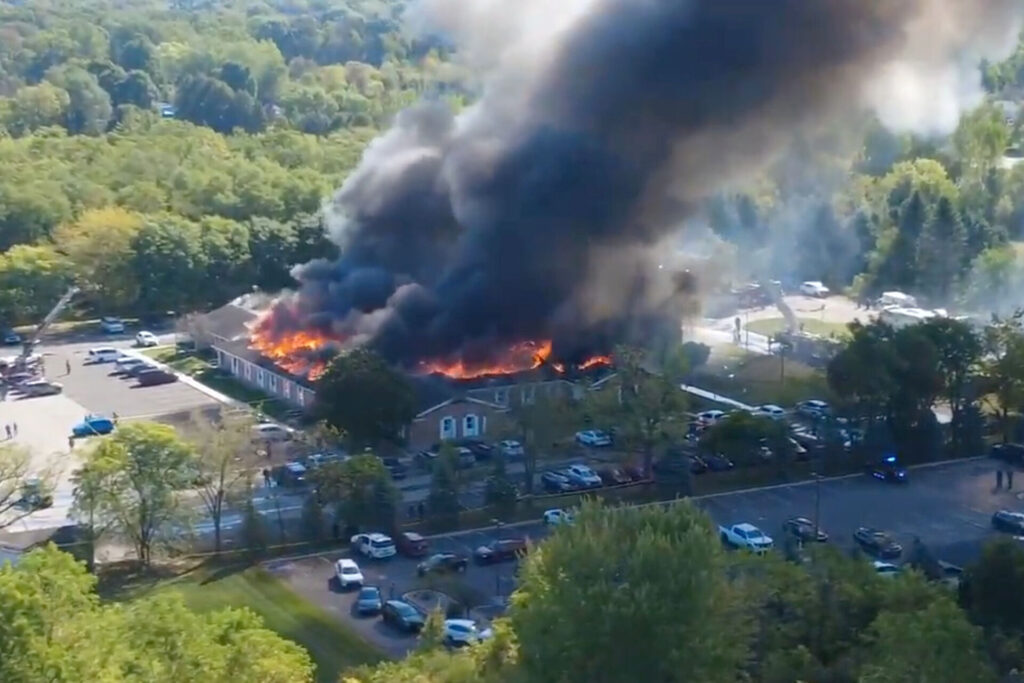Colorado town backs Trump’s deportation plans, setting up contrast with Denver
A Colorado town is backing President-elect Donald Trump’s mass deportation plans and setting up a sharp contrast with Denver, its neighbor to the north, whose mayor has vowed to resist federal immigration agents coming into his city.
Officials of Castle Rock, a town 25 miles south of Denver, on Tuesday night approved a resolution expressing “strong support” for the Trump administration’s mass planned deportation campaign.
Trump earlier identified Colorado as the launching pad for what he dubbed “Operation Aurora,” the start of what he promised to be the largest mass deportation in American history.
In adopting the resolution, Castle Rock’s officials pointed to a study saying the nearly 43,000 immigrants who arrived in Denver over the past two years after illegally crossing the southern border have cost $356 million.
“The Town Council further wishes to express its willingness to take whatever actions may be necessary within the bounds of federal, state, and local law to cooperate with federal immigration officials in this vitally important effort,” the town’s resolution states.
The resolution cites studies saying illegal immigration has been a “significant net fiscal drain” on public funds, and adds that the influx has “overwhelmed many communities by consuming already limited affordable housing, crowding classrooms, and increasing the strain on food banks, transit, and social services.”
Trump’s mass deportation plan will likely run into barriers along state lines, particularly in Colorado, where Democrats hold the levers at the state Capitol.
And it’s not immediately clear how or to what extent local governments, such as Castle Rock, can aid Trump in his campaign.
Castle Rock’s would-be cooperation with federal immigration agents is potentially impacted by two specific state laws:
A 2023 statute that went into effect in Colorado in January restricts the ability of state and local governments to make agreements with federal immigration officials over the detention of immigrants who are unlawfully staying in the country.
In 2019, lawmakers also passed legislation that expressly forbids a law enforcement officer from arresting or detaining an individual based upon a “detainer request.” The law also prohibits a probation officer from providing information about an individual to federal immigration authorities.
An immigration “detainer” is a notice issued to federal, state and local law enforcement agencies informing the latter that ICE intends to assume custody of an individual who is no longer subject to the former’s detention.
ICE said a detainer serves several functions, including requesting information from a local enforcement agency about a person’s impending release and asking the local enforcement agency to maintain custody of the person for a period not to exceed 48 hours — excluding Saturdays, Sundays and holidays — to provide ICE time to assume custody.
Castle Rock’s support for mass deportation is not surprising. The town of 80,000 people is located within Douglas County, a Republican stronghold where Trump won by seven points.
This week, a Denver district court dismissed a lawsuit filed by Douglas County against the state of Colorado over its “sanctuary” laws. The county had argued that they are “illegal and unconstitutional” because they violate the Colorado Constitution’s provisions on intergovernmental relationships and distribution of powers, and they are also preempted by federal immigration laws and regulations, the lawsuit added.
In dismissing the case, District Court Judge David Goldberg concluded that Douglas County does not not have any standing to sue the state. In particular, the judge rejected the county’s argument that it suffered an injury because its sheriff is unable to comply with what’s called a federal immigration detainer request.
The judge noted that the federal government is, in fact, prohibited from mandating that any state comply with a detainer request. As a result, the judge said, Colorado is “free to determine the extent, if at all, the state will comply with civil immigration detainer requests and whether the state will enter into or renew immigration detainment agreements.”
Castle Rock and Denver could quickly become the focal points of the country’s debate over illegal immigration under a second Trump term.
Denver Mayor Mike Johnston kicked off a firestorm last month after vowing to defy any mass deportation campaign in his city, saying he is mulling over “options” to protect the immigrants unlawfully staying in America.
In an interview with Denver Gazette news partner 9News, Johnston said he would protest himself to resist Trump’s deportation plans and that he is “not afraid” of jail time, though he added he is also “not seeking it.”
And Johnston drew parallels to Tiananmen Square in an interview with Denverite, suggesting residents would rise up, alongside Denver police, to resist a mass deportation campaign. The mayor has since walked those statements back.
In response, Castle Rock Councilmember Max Brooks, a Republican who was elected to the state House last month, called Johnston’s position “insurrectionist rhetoric.”
“He defunded law enforcement to fund the asylum seekers for illegal migrants, and yet he thinks (Denver police) was going to turn around and stand shoulder to shoulder with him at the Denver county line defending against federal authorities that are coming in towards illegal migrants,” Brooks previously said.
“It’s laughable,” he said.
At the peak of the immigration crisis in Denver, the Johnston administration redirected funds in order to pay for the city’s response. More specifically, the mayor’s office froze hiring for some positions in the public safety department.
Not everybody on the town council backed the pro-deportation resolution.
At Tuesday’s meeting, Councilmember Ryan Hollingshead, who was recently reelected to a second term, abstained from voting.
“It’s silly we need to pass resolutions every time Denver says something,” Hollingshead said. “I don’t think they care about us that much.”
Hollingshead said the issue is solely meant to create headlines, and that the council rushed the vote “without a lot of thought.”
Residents who showed up to Tuesday’s meeting were divided.
One resident, who supported the resolution, said the town should coordinate with Douglas County when taking steps to confront illegal immigration.
Some defended immigrants illegally staying in the U.S. but who have been working.
“To me as a resident,” said Carolyn Upton, “a ‘yes’ vote is an unnecessary vote for division in the town I love.”
Reporters Nico Brambila, Editor Luige del Puerto and the Associated Press contributed to this report.











